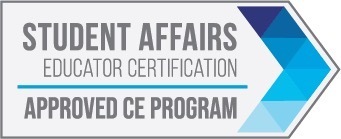
Competencies Initiatives: Shaping the Future of Student Success and Institutional Effectiveness
-
You must log in to register
- Non-member - $999
- Member - $999
Competency development is essential for students as they prepare for a successful transition from college to career. As students experience college, they are able to hone competencies that have real-life implications. Recent NACE data point to employers hiring decisions emphasizing competency proficiency, more so than GPA when considering who to hire. Now, more than ever before, colleges and universities are integrating competencies into the fabric of their student experiences by infusing intentional competency-based student learning into the curriculum and co-curriculum—all with the goal of fostering student success and career readiness.
Join us as association leaders discuss the impact competency implementation has on institutional effectiveness and student preparedness, the importance of competency implementation across the higher education community, opportunities for collaboration between academic and student affairs, and strategies and leading practices with institutions to establish new and enhance existing competency initiatives.
Learning Outcomes:
- Understand the impact of competency implementation on institutional effectiveness and student preparedness.
- Socialize the importance of competency implementation across the higher education community.
- Share strategies and leading practices with institutions to establish new and enhance existing implementation initiatives.
Stephanie Gordon, Ed.D.
Vice President for Strategy & Impact
NASPA
Stephanie A. Gordon, Ed.D. is the Vice President for Strategy and Impact at NASPA–Student Affairs Administrators in Higher Education, where she leads efforts in VPSA programs, corporate development, global impact, consulting programs, and strategic planning. Since joining NASPA in 2003, she has held key leadership roles, shaping professional development and advancing strategic priorities.
Before NASPA, Gordon held leadership positions in residence life, first-year programs, and admissions at Chatham University, Colgate University, and Simmons College. Her research focuses on the competencies of chief student affairs officers and the persistence of first-generation students. She is also a published author in the student affairs field.
Gordon holds an EdD from the University of Pennsylvania, an EdM from Harvard University, and a BA from Simmons College. She is mom to Benjamin, a joyful 5-year-old, and Sadie, a spirited Queen Elizabeth Pocket Beagle.
Matthew Brink
Chief Programs & Content Officer
National Association of Colleges and Employers (NACE)
Matthew Brink is chief content and programs officer for the National Association of Colleges and Employers. He oversees professional development services, meetings and events, content, and all research initiatives. An experienced professional in the field, Brink has overseen career services in a variety of institutions, including, most recently, the University of Delaware, and has been active in employer-focused activities.
Ashely Finley
Vice President of Research and Senior Advisor to the President
American Association of Colleges and Universities (AAC&U)
Dr. Ashley Finley is the Vice President of Research and Senior Advisor to the President for the American Association of Colleges and Universities (AAC&U). She was previously the senior director of assessment and research at AAC&U and the national evaluator for the Bringing Theory to Practice Project. Most recently she served as the associate vice president for academic affairs & dean of the Dominican Experience at Dominican University of California, where she implemented a comprehensive framework for student learning and success centered around high-impact practices, including holistic advising and ePortfolios.
Dr. Finley’s research and campus consultations focus on connecting best practices for program implementation, assessment design, and equity with institutional outcomes for student success and strategic planning. A significant component of this work at the campus and national levels has focused on the connection of students’ personal development (such as resilience, belonging, identity, and sense of purpose) with their learning and civic engagement. She has published a number of articles, book chapters, and monographs, including Assessing Underserved Students’ Engagement in High-impact Practices (with co-author Tia McNair), Civic Learning and Teaching; Assessing Underserved Students’ Engagement in High-Impact Practices; and “Well-Being: An Essential Outcome for Higher Education.”
Prior to beginning her national work, Dr. Finley was a faculty member in the department of sociology at Dickinson College. She received a BA from the University of Nebraska-Lincoln and an MA and PhD, both in sociology, from the University of Iowa.
Amy Geist (Moderator)
Director of Strategic Initiatives
NASPA
Amy Geist is director of strategic initiatives at NASPA–Student Affairs Administrators in Higher Education. Her work at NASPA focuses on supporting institutions in their efforts to remove barriers to student success. She began managing communications and marketing for the ASN in early 2023 after leading NASPA’s emergency aid efforts and other projects since 2016. Prior to her work at NASPA, she served in a variety of student affairs and university administration roles for 14 years at the University of Notre Dame and one year at California State University—Long Beach. She earned a master’s degree in Student Affairs Administration in Higher Education from Ball State University and a bachelor’s degree in Sociology from Jacksonville University.
Continuing Education Credits
NASPA has been approved by the Higher Education Consortium for Student Affairs Certification to provide CE credit for Certified Student Affairs Educators (CSAEd). NASPA is solely responsible for all aspects of this program.
Participants who view this session will be eligible for Continuing Education (CE) credits in the Core Student Affairs Educator Certification (CSAEd™) continuing education.
Guidelines for earning CE credit:
1.5 CE is awarded for attending this live session OR watching it on-demand for ONE category of Continuing Education. You can not receive more than 1.5 credit hour total.
No partial credit will be rewarded.
Participants must also complete the feedback survey in the Online Learning Community.
Reach out to virtuallearning@naspa.org for the continuing education certificate for Social Justice and Inclusion.
To receive CSAEd credit, attendees must complete the Feedback Survey in the online event offering the certification. Once the survey is completed, your Certificate of Completion will be available in the event modules. The Certificate of Completion, which will show the event and credit earnings, is available for download and/or print from the event in your Online Learning Community.


